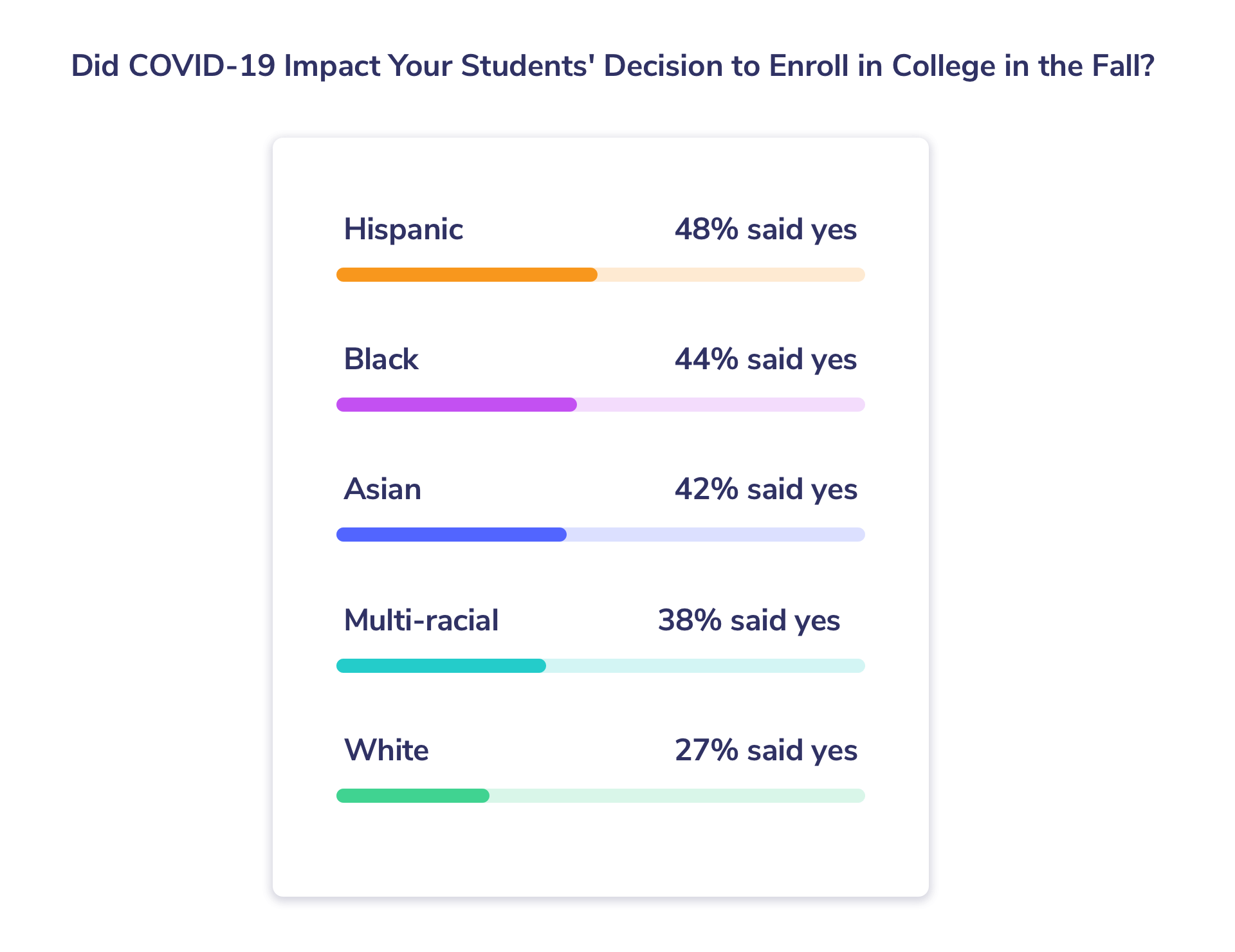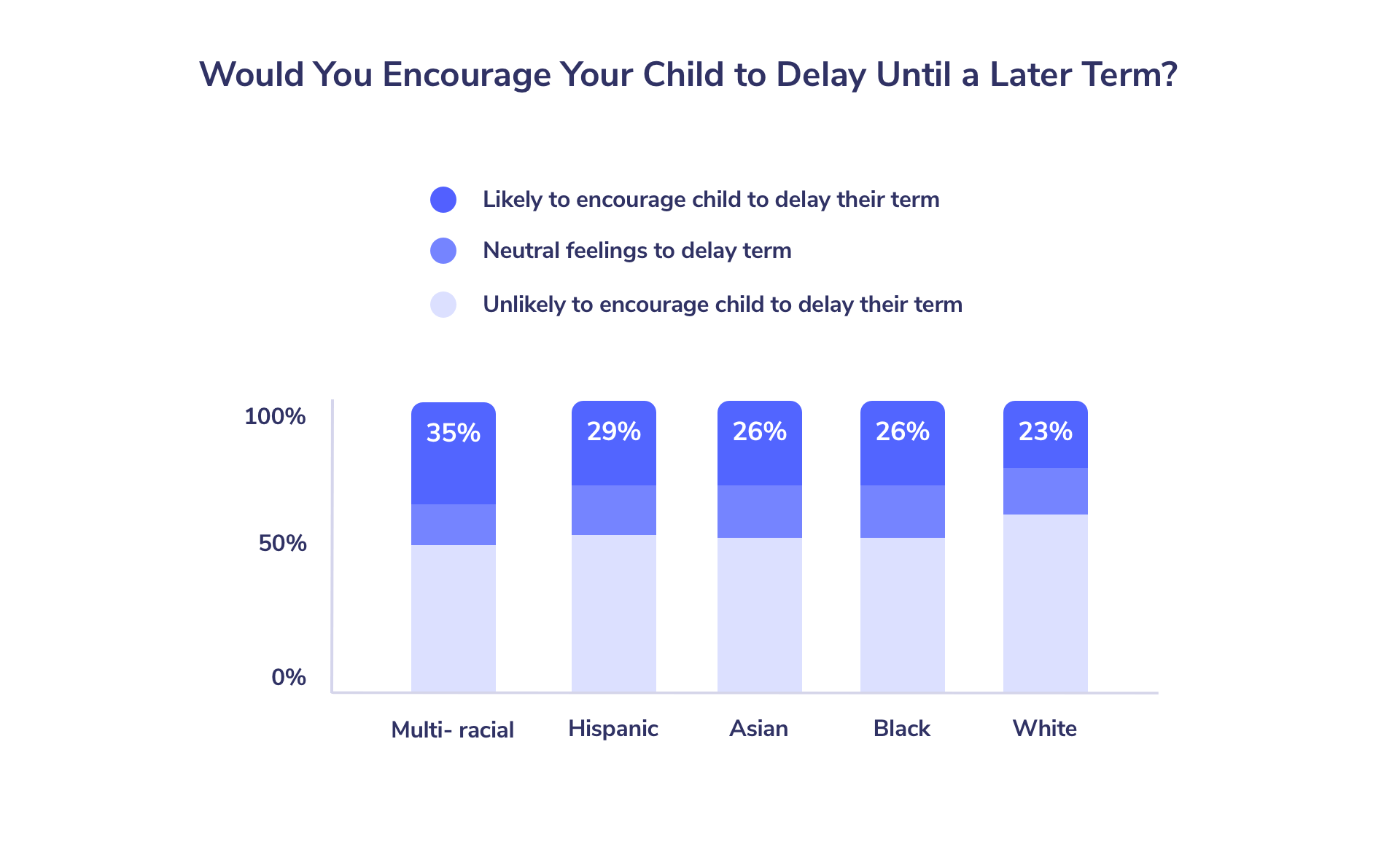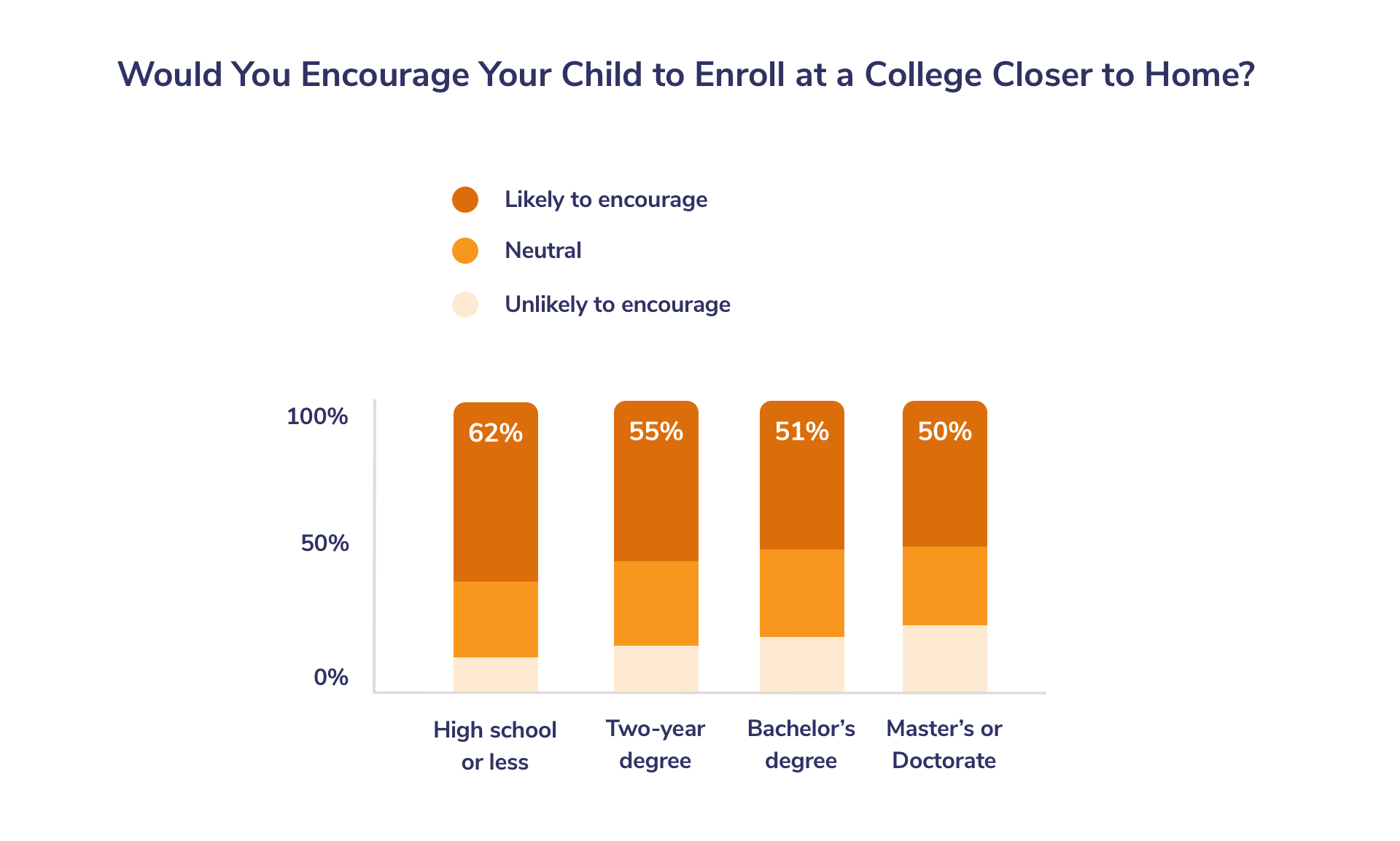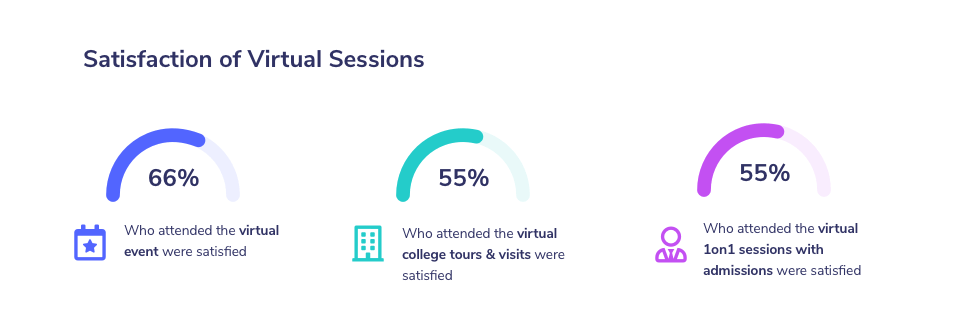
Parents Not Inclined to Delay Child's College Education

Written by Rachel Bean, Content Manager
Published on May 6, 2020
Ask any Fortune 100 advertiser how to connect with teenagers and you’ll get a sermon on the power of social influencers like Kim Kardashian, Logan Paul and the like. Like windmills, they generate viral energy and excitement around new products and services that net big sales returns. So who are some of the biggest influencers when it comes to college?
Well, Mom and Dad.
Given all the fresh research measuring student sentiment during COVID-19 and their evolving college enrollment intentions for the fall, one might be very circumspect and concerned that these responses are fairly one-dimensional. Students posit that 89% of them have no intention of delaying their education, but how do parents, the primary influencers in this matter, feel about enrollment this fall?
In collaboration with RNL, CampusESP and NAIA, we recently fielded a study of more than 3,400 parents to take the pulse on how they are weathering college enrollment for this fall.
Parents of College-Bound Students & College Planning As A Result of COVID-19 is an online survey proctored by RNL. The survey provides interesting insights on the financial and emotional impact of COVID-19 on college enrollment, as well as identifies the areas of highest concern and uncertainty. Broken down by caretakers of seniors as well as juniors, geographical location, ethnicity, and education level, it provides insight on both the approaching 2020 class as well as the following 2021 class.
In many ways, it reinforces what we already know: that parents with a 2-year degree or less are financially impacted more than those with a bachelor’s degree, and that minorities, regardless of education level, are more likely to suffer financial strain.
In other ways, however, it revealed somewhat surprising sentiments. The majority of parents do want their students to enroll closer to home, but not many want them to live at home.
By analyzing answers from parents, students, and their online behavior, we can get closer to making better predictions for Fall 2020 and beyond.
Have You Been Personally or Financially Impacted by COVID-19?
Across the board, three-fourths of parents, for both juniors and seniors, said yes, they had been personally and/or financially impacted by COVID-19. This is the one area where those affected is relatively even across the board, regardless of ethnicity.
The one factor that seemed to influence the impact of COVID-19 has to do with level of education. Those with a 4-year degree or higher were less likely to have been personally or financially impacted by the pandemic.
On average, 34% claim that the pandemic has affected their students’ decision, with the highest impact in the Northeast and West. Those of Hispanic ethnicity feel that impact most deeply, followed by African American and Asian families, respectively, with white families feeling the least amount of strain.

When it comes to financial hardship in particular, there’s increased importance on financial aid and scholarships for both juniors and seniors, as most foresaw. Need is cited as greatest in the South and West, but the heaviest burden falls on black families. Parents of both education levels cited financial aid and scholarships as most important when determining where to attend college.
One interesting aspect to note is that, across the board, parents of juniors responded increased financial need over parents of seniors. While no one will be able to say for sure until the pandemic is passed, this may indicate that the educational system should prepare for longer term care of financially disadvantaged students.
Not Delayed, but Still Cautious
One of the most worrisome aspects for the coming semester is enrollment and attendance. If it’s up to the parents, the majority of students will not delay their education. More than 55% of parents say that it’s unlikely that they would encourage their students to start during a later term.
This is good news.
Breaking this down by ethnicity and geographical location, we do see some variations. Least likely to delay are white and Asian families, while Hispanic and multi-racial families are most likely.

That said, more than 50% of each ethnicity group says that it’s unlikely that they would encourage their students to delay their education. These numbers skew upward based on the education of the parent, with those with 4-year degrees or higher even more unlikely to encourage delay.
Close to Home, but Not At Home
The largest change when it comes to attending college, is that parents are more likely to want their child to enroll at a college that’s closer to home. More than 50%, regardless of education level, say that it’s likely that they’d prefer their teens to be within proximity of their family home.

Those numbers are distinctly correlated with level of education, as well. Parents with a high school degree or less are more likely to want their children closer to home than those with a graduate degree.
In contrast to that, parents don’t necessarily want their kids close enough to live at home, or, even if they could live at home, they don’t lean towards encouraging them to become commuters. There’s a level of uncertainty here, likely due to the fact that their seniors’ first semesters will be virtual, but, for the majority of parents, they envision their children on campus, fully experiencing college.
The one exception to this is parents with a high school education or less — 46% said they would prefer their kids to live at home and commute to college, versus 33% of parents with bachelor’s degrees.
Parents Absent at Virtual Sessions — You Didn’t Explicitly Invite Them.
In general, parents say they’re satisfied with how colleges have handled the COVID-19 pandemic. The majority of parents rated the handling of current events as “good” — which is great.
Parents don’t seem to be involved in the virtual events portion of choosing colleges, though, despite normally being the ones to take their students to in-person visits. For juniors, an average of 67% of parents hadn’t attended a single virtual event. For seniors, that number was only slightly better, with an average of 61% of parents not attending an event.
Why not?
The top cited reason was that they hadn’t been invited. With parents often having significant sway in their students' decisions, especially when it comes to signing off financially, it’s pertinent that they’re included.

While roughly half of parents are satisfied with the events they attended, there’s a large portion who are ambivalent, and a chunk that were very dissatisfied with their experiences. Considering the speed with which institutions have had to stand up virtual offerings universally, these are findings to be proud of.

In Conclusion
The financial and personal impacts of COVID-19 are widespread. Parents are vying to keep their teens closer to home in case the impacts of the pandemic worsen, minorities have been hit the hardest financially, and it’s likely that the class of 2021 will still be experiencing residual financial hardships, too.
The good news is really good though: parents don’t want their students to delay education and most want them to get the full experience, living on campus and all. To hook parents into your institution, you need the emotional attachment, which is normally secured in the on-campus tour. Explicitly invite parents to virtual tours and show them that the health and well-being of students is at the forefront of your minds.